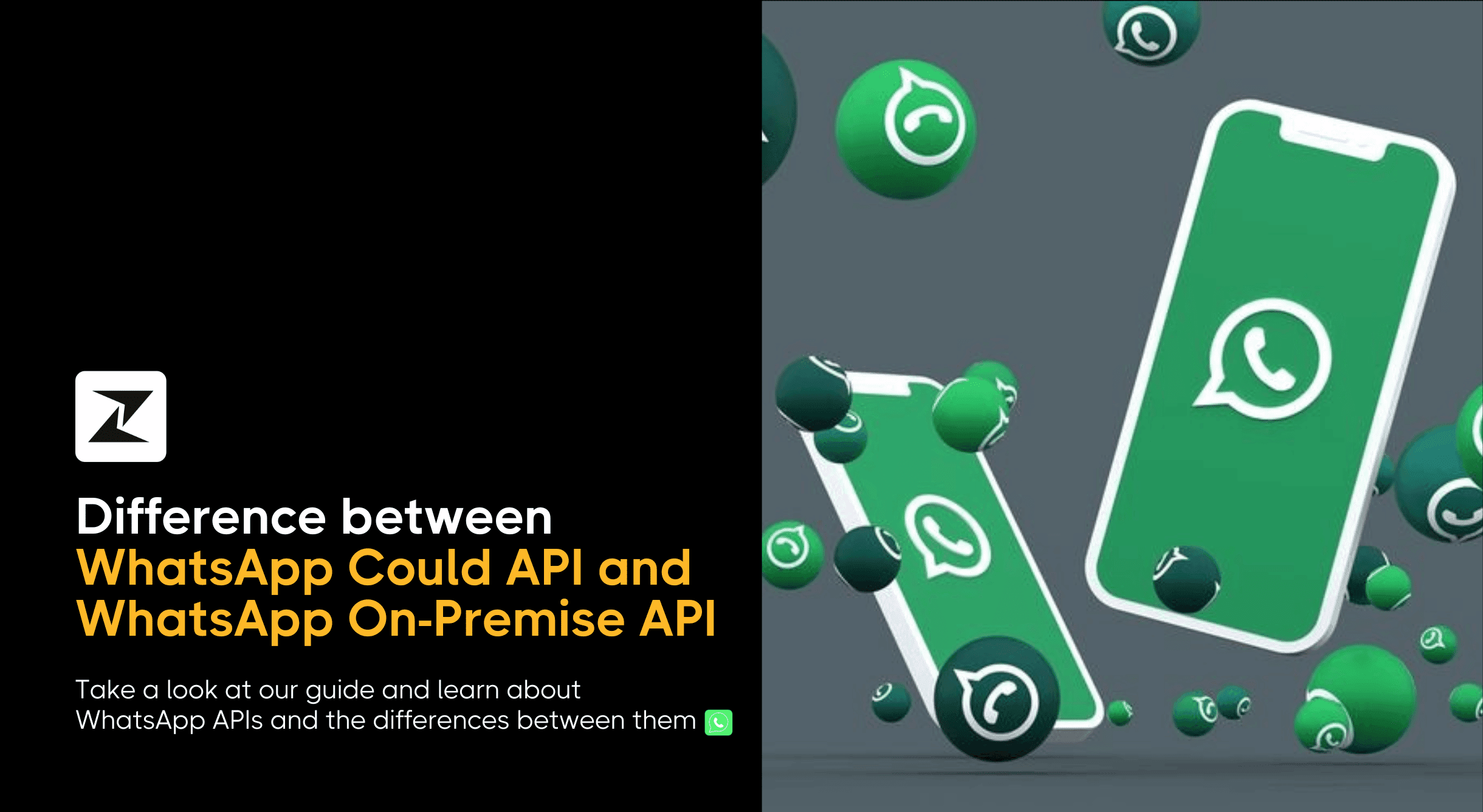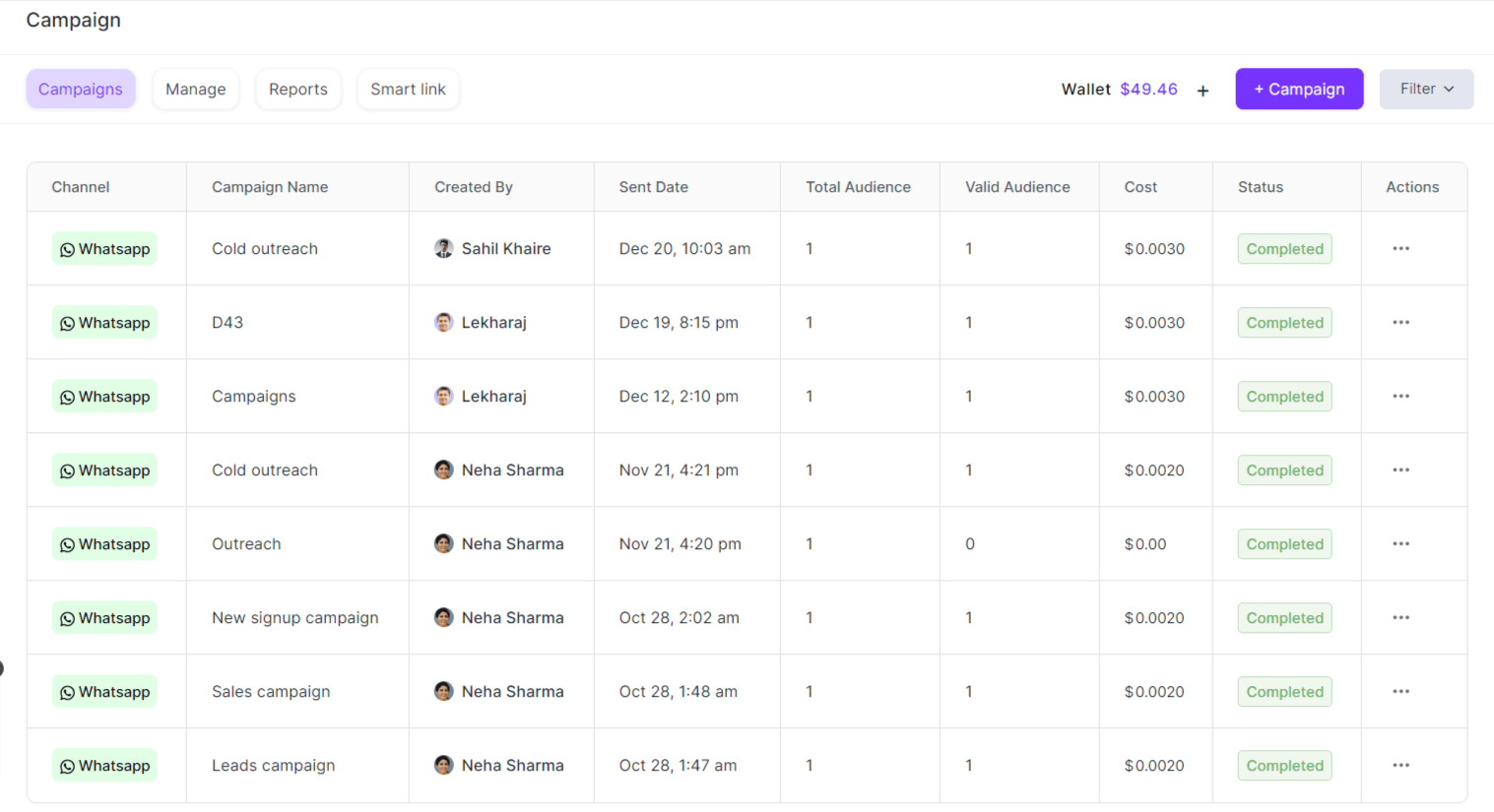WhatsApp Cloud API vs WhatsApp On-Premise API: Intro Guide

In the modern era of communication, WhatsApp has become an integral part of our daily lives. With its user-friendly interface and extensive features, it has revolutionized the way we connect with others.
For businesses, WhatsApp provides powerful APIs that allow them to integrate the platform into their systems and run their WhatsApp marketing campaign ideas with ease. In this beginner's guide, we will delve into the comparison between WhatsApp Cloud API and WhatsApp On-Premise API, empowering you to make an informed decision between the two APIs of WhatsApp business message platform. Whether you are new to WhatsApp APIs or considering implementing them within your organization, this comprehensive exploration will provide valuable insights and guidance.
Are you ready to supercharge your business's communication strategy with the mighty force of WhatsApp? Brace yourself for an epic showdown as we dive into the battle of WhatsApp Cloud API versus On-Premise API. Each has its own set of features and considerations, making it crucial for businesses to understand the differences and choose the right fit for their specific needs.
Make the most of WhatsApp Cloud API with Zixflow
Integrate Zixflow with WhatsApp Cloud API to send bulk messages within seconds
Contact SalesUnderstanding WhatsApp APIs
WhatsApp APIs, or Application Programming Interfaces, allow businesses to connect their systems or applications with WhatsApp, enabling them to send and receive messages, images, and other media through the platform. This integration offers businesses the opportunity to streamline their communication processes, improve customer service, and enhance overall sales efficiency.
One of the primary benefits of using WhatsApp APIs is the ability to automate messaging workflows. Businesses can set up automated messages, such as welcome messages, order confirmations, and delivery updates, to be sent to customers at specific stages of their interaction. WhatsApp message automation not only saves time and resources but also ensures consistent and timely communication, enhancing the customer experience. And with some WhatsApp automation tips, businesses can make their messaging workflow smooth and effective.
Before diving into the comparison, let's briefly understand what WhatsApp APIs offer.
WhatsApp Cloud API
The WhatsApp Cloud API allows businesses to integrate WhatsApp messaging into their applications or customer relationship management (CRM) systems. It enables you to send and receive messages, automate workflows, and access essential features such as message templates, multimedia sharing, and notifications.
WhatsApp, with its massive user base, has emerged as a highly effective platform for business communication. By integrating WhatsApp Cloud API with CRM software, businesses can seamlessly run campaigns and engage with their customers in a more personalized manner.
One of the key advantages of integrating WhatsApp Cloud API with sales automation software is the ability to send automated messages to a large number of recipients by leveraging WhatsApp broadcasting feature. This eliminates the need for manual intervention, saving time and resources. Whether it's sending promotional offers, reminders, or important updates, automation software powered by WhatsApp Cloud API ensures that your message reaches the right people at the right time.
Zixflow is a powerful tool that simplifies the sales process and helps businesses run successful campaigns. One of its standout features is the integration of WhatsApp Cloud API, which allows seamless communication between businesses and their customers.
By integrating the WhatsApp Cloud API, Zixflow enables businesses to reach their target audience directly. This direct and personalized approach enhances customer engagement and increases the chances of conversion.
The process is simple and efficient. To get started, businesses need to add a campaign name, followed by selecting the desired audience and template. With these essential elements in place, businesses can now send out their campaign, ensuring their message reaches the right people at the right time.




One of the key advantages of using the WhatsApp Cloud API through Zixflow is the ability to gain detailed analytics of whatsapp business marketing efforts and track the progress of your campaigns. This feature provides invaluable insights into the effectiveness of your messaging, allowing you to fine-tune your approach and maximize your reach.
WhatsApp On-Premise API
WhatsApp on-premises refers to a self-hosted version of the messaging platform, allowing businesses to establish their own private communication network.
By deploying WhatsApp on-premises, organizations can enjoy enhanced security and data privacy. The sensitive information shared through WhatsApp can remain within the organization's infrastructure, eliminating the risk of data breaches or unauthorized access. This is particularly crucial for industries that handle confidential data, where even a small breach can have severe consequences.
WhatsApp Cloud API vs. WhatsApp On-Premise API
Differentiating between the WhatsApp Cloud API and the WhatsApp On-Premise API involves considering your organization's specific needs and priorities.
With WhatsApp Cloud API, Facebook grants direct access to the Cloud API within minutes and in the case of WhatsApp Business API, it is the Business Service Providers (BSPs) who serve as intermediaries to facilitate approval for WhatsApp Business API.
In the on-premise WhatsApp Business API, BSPs incurred hosting charges for WhatsApp Business API and with WhatsApp Cloud API, Facebook shoulders all the expenses related to hosting and providing access.
While WhatsApp Cloud API is hosted on Meta's servers, WhatsApp On-premises API is hosted on BSP's servers.
Let's explore more distinctions between the WhatsApp Cloud API and WhatsApp On-premise API, as both versions are designed to facilitate seamless messaging interactions between businesses and users. Each option presents unique advantages and considerations.
Deployment and infrastructure
WhatsApp Cloud API
With the Cloud API, you don't need to worry about infrastructure management. WhatsApp handles the infrastructure, scaling, and availability, ensuring seamless communication with your customers. It simplifies integration as you can access the API via secure web endpoints.
The Cloud API is hosted on WhatsApp's infrastructure, leveraging their cloud servers and resources. This means that businesses do not need to set up and manage their own servers, data centers, or networking infrastructure. So, running campaigns and implementing effective sales engagement becomes easy by using WhatsApp Cloud API.
WhatsApp On-Premise API
The On-Premise API requires businesses to set up and maintain their own infrastructure. You have complete control over the deployment, allowing customization to meet specific security, compliance, and data privacy requirements. This option suits organizations that prioritize data sovereignty or have stringent regulatory obligations.
Hosting the API on-premise allows businesses to maintain full control over data privacy and security. They can implement their own security measures and align with their organization's data protection policies and compliance requirements.
Ready to connect Zixflow with your WhatsApp Cloud API?
Link your WhatsApp account with Zixflow by entering a few details and elevate your WhatsApp outreach to the next level
Book a DemoSecurity and compliance
WhatsApp Cloud API
The Cloud API offers robust security measures, including encryption in transit and at rest. WhatsApp follows industry-standard security practices to safeguard user data. However, it's important to note that data resides on WhatsApp's servers, which may have implications depending on your specific compliance needs.
WhatsApp uses end-to-end encryption, ensuring that messages sent through the API are securely transmitted and can only be accessed by the intended recipients. The API enforces strict authentication and authorization mechanisms, ensuring that only authorized users and applications can access and send messages.
WhatsApp employs advanced threat detection and prevention mechanisms to identify and mitigate potential security risks, such as spam, phishing, and malicious activities.
WhatsApp On-Premise API
For businesses with strict security and compliance requirements, the On-Premise API offers greater control. You can implement security measures tailored to your organization's standards, ensuring data sovereignty and regulatory compliance.
It enables you to store and manage user data within your own infrastructure, providing an additional layer of control. By using an On-Premise API for your WhatsApp marketing strategy, you can have a sense of security knowing that the user data is stored within your own infrastructure and is not reliant on external third-party systems. This can help protect sensitive user information and ensure that it is not accessed or compromised by unauthorized individuals.
Maintenance and updates
WhatsApp Cloud API
By choosing the Cloud API, you offload infrastructure management, maintenance, and updates to WhatsApp. This allows you to focus on your core business activities, without worrying about the underlying technical aspects. WhatsApp takes care of system updates and enhancements, ensuring smooth operation.
Gone are the days when businesses had to allocate significant resources to manage their infrastructure. With WhatsApp Cloud API, you can rest assured that WhatsApp takes care of system updates and enhancements, ensuring smooth operation. This not only saves you time but also provides peace of mind, knowing that your communication channels are always up to date and functioning optimally.
WhatsApp On-Premise API
With the On-Premise API, you are responsible for managing the infrastructure, including routine maintenance, system updates, and feature enhancements. This requires a dedicated team to handle the technical aspects of maintaining and scaling the WhatsApp infrastructure within your organization.
Scalability and performance
WhatsApp Cloud API
The Cloud API provides automatic scalability to handle varying traffic loads. As your user base grows, WhatsApp infrastructure scales to accommodate the increased demand. This ensures consistent performance and reliability without requiring you to manage infrastructure resources.
WhatsApp API also allows you to create instant responses to customer queries and even initiate conversations to gather valuable information. While there are various platforms available to create chatbots, utilizing the WhatsApp API offers unique advantages.
By integrating the WhatsApp API into your lead generation chatbot strategy, you can tap into this vast network and access a wide range of potential customers. One of the key benefits of using the WhatsApp API for chatbot development is its user-friendly interface. WhatsApp is already familiar to most people, making it easier for them to interact with your chatbot.
WhatsApp On-Premise API
The On-Premise API allows you to optimize infrastructure resources based on your specific requirements. You have complete control over scalability, enabling you to allocate resources according to expected traffic patterns. However, scaling the infrastructure to handle sudden surges in usage might require proactive monitoring and additional capacity planning.
Link WhatsApp Cloud API and Zixflow to automate your WhatsApp marketing
With our solution, you can put your WhatsApp marketing efforts on autopilot effortlessly
Explore MoreChoosing the right solution
The decision between WhatsApp Cloud API and WhatsApp On-Premise API depends on your business needs, priorities, and resources.
Opt for the WhatsApp Cloud API if you require a quick and straightforward integration process, want to leverage WhatsApp's cloud infrastructure, and prioritize scalability and ease of maintenance.
Choose the WhatsApp On-Premise API if you have strict data privacy and security requirements, need enhanced control over the infrastructure, and have the necessary resources and expertise for managing an on-premise solution.
As a business, you are constantly communicating with potential clients, managing leads, and coordinating with your team. This can become overwhelming, especially when you have multiple conversations happening simultaneously. The Cloud API allows you to integrate WhatsApp into your existing CRM and sales management system, ensuring that all your conversations are centralized and easily accessible. This not only saves you time but also ensures that you never miss out on any important details or follow-ups.
Zixflow, a leading sales automation platform that also facilitates communication, offers seamless integration with WhatsApp Cloud API. With Zixflow, you can take your sales game to the next level by incorporating WhatsApp into your existing CRM workflow. The integration allows you to send automated messages, receive instant notifications, and even track customer interactions,
